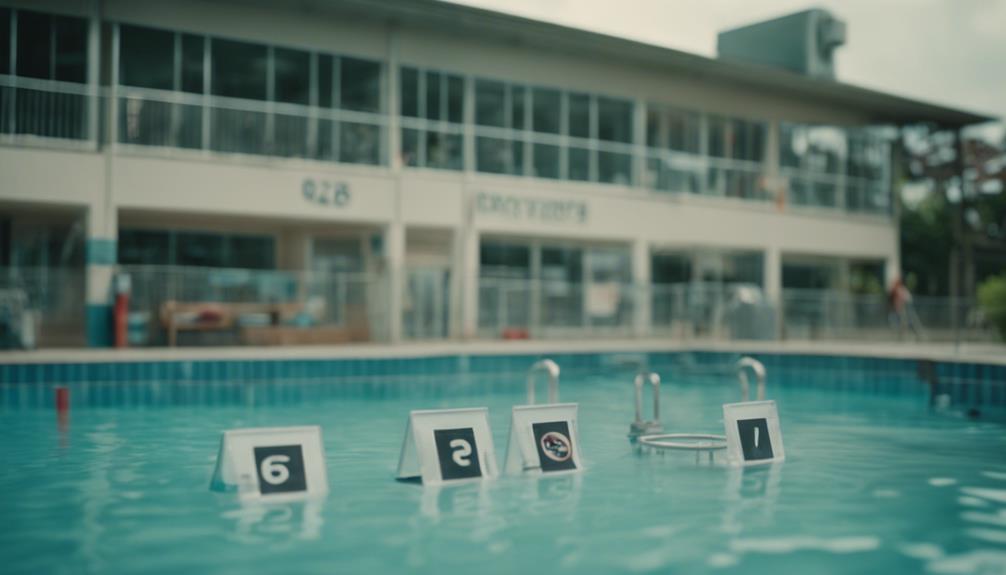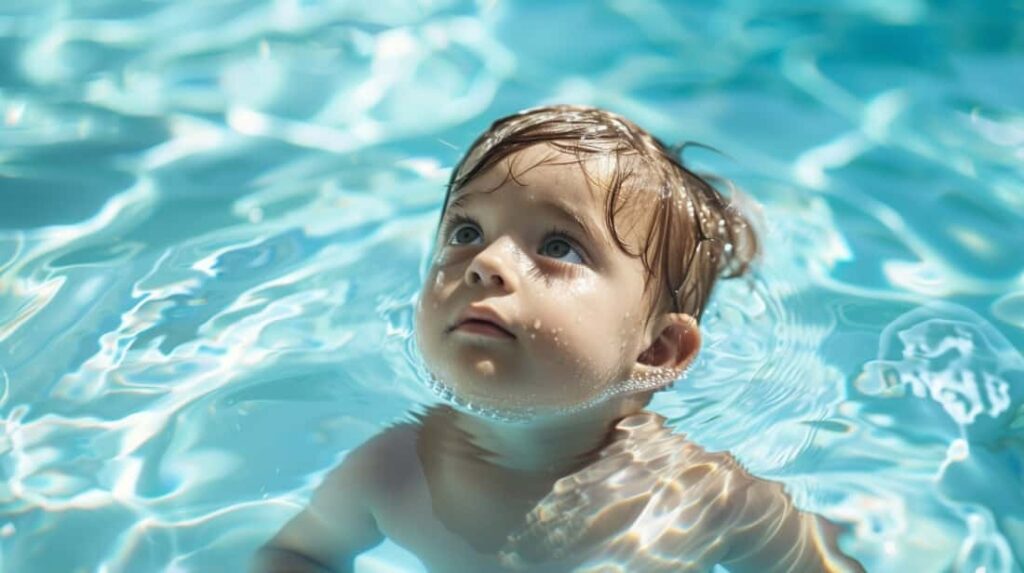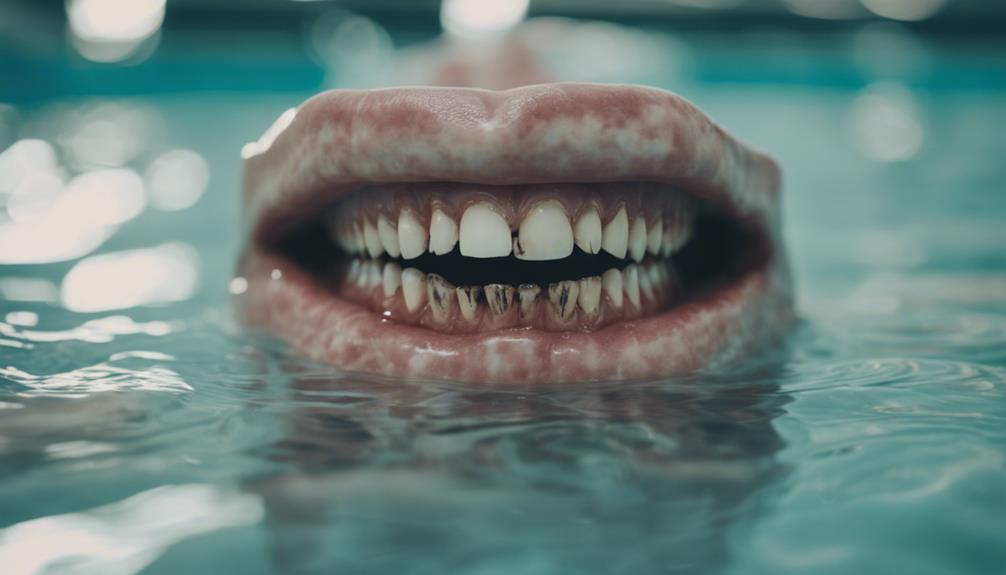Stay informed about common swimming pool infections in order to protect yourself. Be vigilant for swimmer’s ear, skin rashes, diarrhea, and respiratory issues. Symptoms to watch for include red rashes, eye irritation, and upset stomach after swimming. Vulnerable groups should take extra precautions. Reduce risks by ensuring proper chlorination, using safety equipment, and covering any wounds. Be on the lookout for exposure to Cryptosporidium and consult healthcare providers when necessary. Prompt treatment may involve antibiotics, antifungal medications, and over-the-counter remedies. Take necessary precautions for a safe swimming experience and peace of mind.
Key Takeaways
- Swimmer’s ear and skin rashes can result from unclean pool water.
- Diarrhea outbreaks may occur from pathogens like Cryptosporidium.
- Pneumonia and respiratory infections can stem from poorly maintained pool water.
- Watch for symptoms like diarrhea, skin rashes, eye, and respiratory irritation.
- Vulnerable groups should take extra precautions to prevent infections.
Types of Swimming Pool Infections
Discussing the types of swimming pool infections can help you understand the potential risks associated with pool water exposure. Contaminated water can lead to common swimming-related illnesses like swimmer’s ear. This infection occurs when bacteria or fungi enter the ear canal, often due to unclean pool water.

Additionally, skin rashes and irritations can result from exposure to harmful pathogens in the water, causing discomfort and potential infections. Diarrhea outbreaks are also prevalent, with pathogens like Cryptosporidium surviving in water for extended periods, posing a risk to swimmers.
Pneumonia and respiratory infections are other concerns, as inhaling germs and chemicals from poorly maintained pool water can lead to serious health issues. By being aware of the types of infections that can arise from swimming in contaminated pool water, you can take precautions to protect yourself and others from these potential health risks.
Symptoms and Signs to Watch For

Look out for various symptoms and signs that may indicate you have contracted a swimming pool infection. Common swimming-related illnesses include diarrhea, skin rashes, and irritation of the eyes or respiratory system. If you experience frequent loose bowel movements after swimming, it could be a sign of infection. Skin rashes, especially if they’re red, itchy, or accompanied by blisters, may also indicate a problem. Additionally, irritation in the eyes or respiratory tract, such as redness, itchiness, or difficulty breathing, shouldn’t be ignored.
These symptoms can be caused by pathogens like Cryptosporidium, which can survive in water for over a week. Remember, the most vulnerable to swimming pool infections are children, pregnant individuals, and those with weakened immune systems.
To minimize the risk, make sure that the pool water is properly treated with chlorine or bromine. If you notice any of these symptoms, seek medical advice promptly to prevent further complications.
Risk Factors for Infection

To minimize the risk of contracting swimming pool infections, individuals at higher susceptibility, such as children, pregnant individuals, and those with weakened immune systems, should be aware of the specific risk factors associated with these infections.
One major risk factor is exposure to Cryptosporidium in water, particularly important for immune-compromised individuals. This parasite can cause severe gastrointestinal issues.
Additionally, common infections like diarrhea, skin rashes, swimmers ear, pneumonia, and eye/respiratory irritation are prevalent in swimming pools.
If you fall into the vulnerable categories mentioned, it’s essential to consult a healthcare provider before taking a dip to assess the potential infection risks.
Prevention and Safety Measures

Implementing proper prevention and safety measures is essential for ensuring a safe and enjoyable swimming experience. One critical aspect is ensuring that the pool water is properly chlorinated to reduce the spread of germs. Trained staff and the presence of safety equipment play a significant role in minimizing the risks of injuries and drowning incidents. Before taking a dip, it’s wise to check the health department inspection results to guarantee that the pool complies with safety standards. Additionally, having secure drain covers and visible safety equipment such as lifebuoys and first aid kits are crucial for preventing accidents and injuries in pools. Remember to cover any open wounds with waterproof bandages before swimming to lower the risk of infections. By following these preventive measures, you can relax and enjoy your time in the water with peace of mind.
| Prevention Measures | Importance | Tips |
|---|---|---|
| Proper Chlorination | Reduces germ spread | Regularly check chlorine levels |
| Trained Staff | Decreases injury risks | Ensure staff is certified |
| Safety Equipment | Essential for accident prevention | Inspect equipment regularly |
Treatment for Swimming Pool Infections

When addressing swimming pool infections, the treatment typically involves utilizing antibiotics for bacterial infections and antifungal medications for fungal infections, along with over-the-counter remedies for common ailments such as swimmers ear. Antibiotics are commonly prescribed to combat bacterial infections like skin rashes or ear infections that may result from swimming in contaminated pool water.
On the other hand, antifungal medications can help with fungal infections such as athlete’s foot that can be acquired from swimming pool areas. For issues like swimmers ear, over-the-counter ear drops can provide relief from symptoms.
Additionally, proper wound care and topical ointments are essential in aiding the healing process of cuts or abrasions that become infected post-swimming. Remember, it’s important to seek medical advice if symptoms persist or worsen despite initial treatment efforts.
Frequently Asked Questions
What Is the Common Infection in Swimming Pools?
The common infection in swimming pools is diarrhea, skin rashes, swimmers ear, pneumonia, and eye/respiratory irritation. Contracted by swallowing, contacting, or inhaling contaminated water, these infections pose risks, especially for vulnerable individuals.
What Is the Most Commonly Reported Recreational Water Illness?
Diarrhea is the most commonly reported recreational water illness. Germs like E. coli and norovirus often cause outbreaks. Swallowing contaminated water spreads the illness. Chlorine or bromine treatment helps reduce germs. Follow safety guidelines to prevent infections.
What Skin Infections Can You Get From a Swimming Pool?
You can get skin infections like athlete’s foot, ringworm, and impetigo from a swimming pool. Fungi, bacteria, or viruses in contaminated water cause redness, itching, swelling, and blisters. Shower before and after swimming to prevent infections.
What Sickness Bugs Can You Get From a Swimming Pool?
You can get various sickness bugs from a swimming pool, such as diarrhea, skin rashes, swimmers ear, pneumonia, and eye/respiratory irritation. Swallowing, contacting, or inhaling contaminated water can expose you to these infections. Stay informed and cautious.
What Are the Most Common Swimming Pool Infections and How Can They Be Prevented?
Swimming pools can harbor bacteria and parasites, potentially causing infections like UTIs. To prevent preventing UTIs from pool water, make sure the pool is properly maintained with adequate levels of chlorine and pH. Showering before and after swimming can also help reduce the risk of infection.
Conclusion
So, next time you take a dip in a swimming pool, remember to keep an eye out for any signs of infection.
By being aware of the most common swimming pool infections, you can take steps to protect yourself and your loved ones.
Stay safe, stay healthy, and enjoy your time in the water with peace of mind.
Happy swimming!










